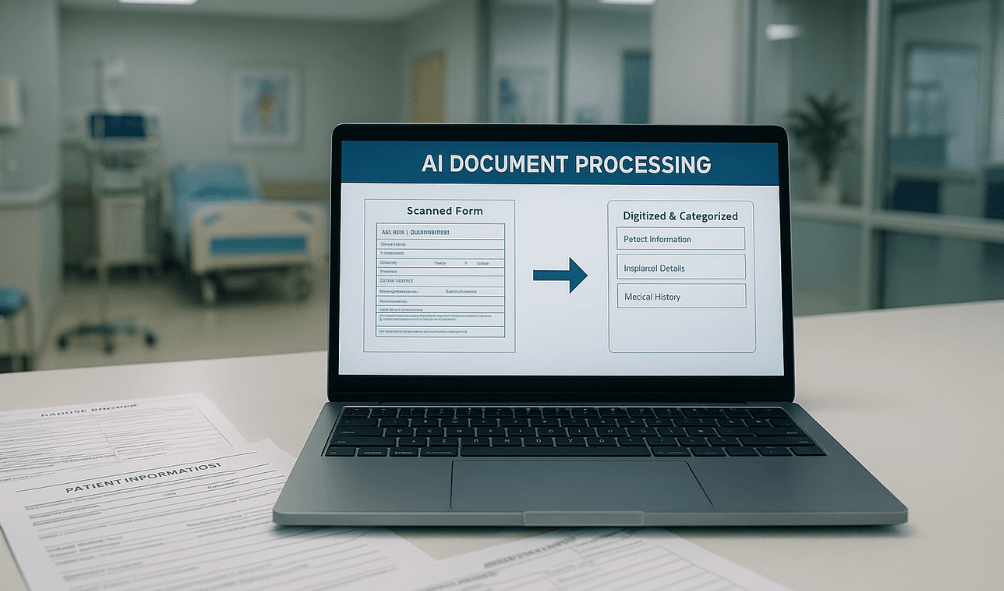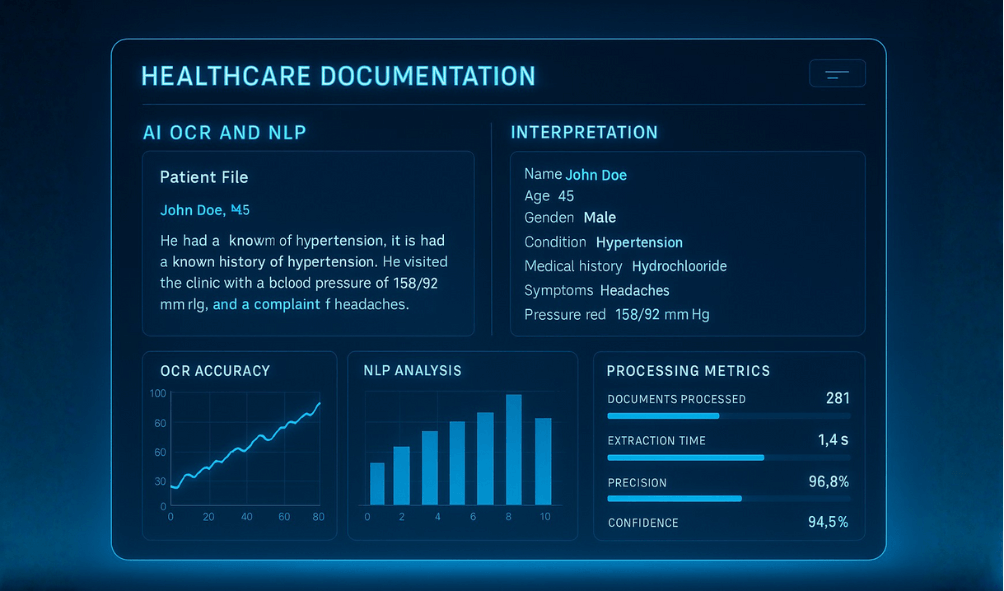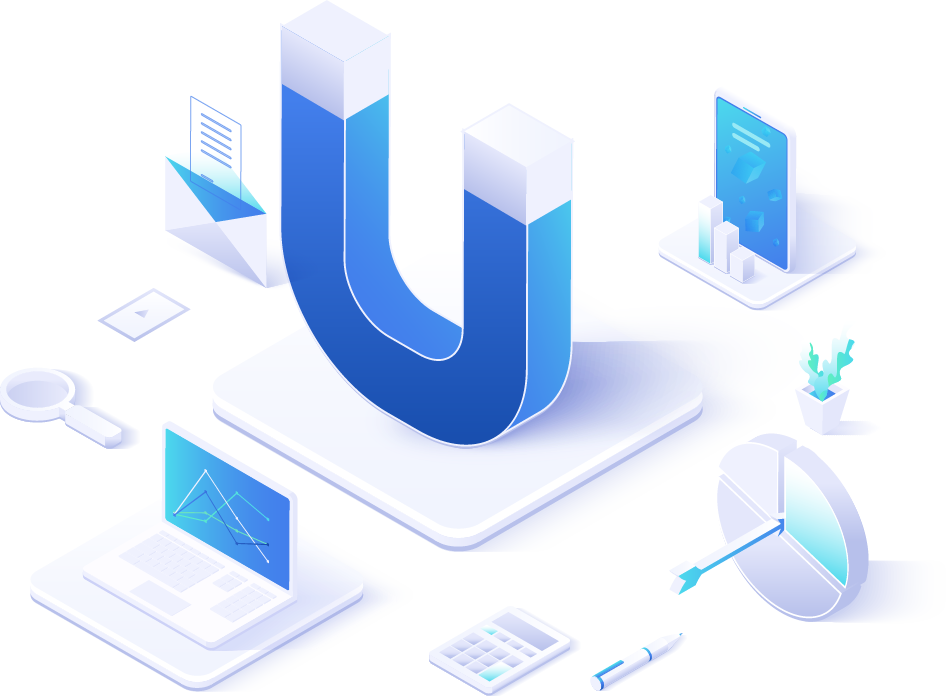- The Growing Complexity of
Healthcare Documentation
Discover how AI helped streamline medical data, reduce errors, and improve clinical efficiency.


Healthcare systems around the world are under increasing pressure. Hospitals, clinics, diagnostics centers, and specialty providers handle thousands of documents every day – patient reports, lab results, insurance forms, discharge summaries, prescription notes, admission details, compliance files, and more. The rising volume of medical records and regulatory requirements has created a major bottleneck for frontline healthcare workers. In the case of TechCorp, inefficient document processing had become a persistent challenge, affecting clinical workflows, patient history accuracy, and timely service delivery. Recognizing the urgent need to streamline operations, TechCorp turned to AI-powered automation to eliminate manual burden and modernize its documentation process.
Before adopting AI automation, TechCorp depended heavily on manual reviewing, data entry, and cross-checking of medical records. Nurses and administrative staff had to scan through handwritten notes, verify lab values, enter information into EHR systems, and organize reports based on departmental requirements. This process consumed hours every day and diverted valuable clinical time away from patient care. Errors were frequent. Inconsistent formatting, missing data, illegible handwriting, and duplicated records created major operational inefficiencies. These issues slowed diagnosis decisions and increased patient wait times.
Additionally, healthcare compliance requires accurate and traceable documentation. Any inconsistency or oversight can result in penalties, delays in claims processing, or compromised patient safety. TechCorp realized that manual processes were not scalable and that digital transformation was essential.
To address these challenges, TechCorp implemented an advanced AI-driven document processing system built on natural language processing (NLP) and optical character recognition (OCR) technology. Unlike traditional OCR tools, this AI system could interpret context, understand clinical terminology, categorize documents automatically, and extract structured data accurately. The AI learned from existing medical records, adapting to abbreviations commonly used by clinicians, identifying key medical terms, and recognizing patterns across different types of documents.
The system worked in real time, processing scanned files, uploaded PDFs, or digital documents. It automatically routed information to appropriate departments and matched data with existing patient records. TechCorp integrated this AI engine with their existing EHR system, enabling seamless synchronization between document processing and patient data management.
Within just three months of deployment, TechCorp experienced a remarkable transformation. Document processing speed increased by 40%, allowing clinicians and administrative teams to complete tasks that previously took hours in a fraction of the time. Medical records were digitized and categorized instantly. Reports were available to doctors within seconds, reducing delays in diagnosis and improving treatment planning.

Automating repetitive tasks gave healthcare professionals more time to focus on patient care. Nurses no longer spent hours sorting documents. Physicians had immediate access to accurate patient histories and previous records. Administrative staff handled significantly fewer queries related to missing information. This improved both staff morale and patient experience.
Operational workflows became smoother. Appointments moved faster, lab results were updated promptly, and communication between departments improved. The AI system provided real-time insights into document movement and processing status, reducing bottlenecks.
Healthcare is one of the most heavily regulated industries, requiring strict adherence to compliance standards. TechCorp’s AI solution improved compliance accuracy by automatically detecting missing signatures, incomplete fields, or incorrect data formats. It ensured every document met regulatory standards before being approved or stored.
Data security was also strengthened. AI systems logged every action, making document trails traceable and auditable. Sensitive patient data remained encrypted and accessible only to authorized personnel. This reduced risk and strengthened the hospital’s legal and compliance posture.
One of the greatest advantages of AI-powered healthcare documentation is scalability. As TechCorp expanded operations, added new departments, and increased patient volume, the AI system adapted seamlessly. The automation platform handled growing workloads without requiring additional manpower.
Long-term benefits included reduced administrative costs, improved staff satisfaction, higher patient throughput, and a more organized clinical data environment. TechCorp became more agile and capable of handling sudden surges in documentation during peak seasons or emergencies.
TechCorp’s success proves that AI-driven automation is not just a technology upgrade – it is a strategic investment that improves efficiency, accuracy, compliance, and patient care. With 40% faster document processing, reduced manual workload, and enhanced data reliability, AI has become indispensable in healthcare operations. As more healthcare providers adopt intelligent automation, the future promises faster workflows, smarter decision-making, and better outcomes for both caregivers and patients.
Subscribe to the CogniXsoft newsletters – Join our community to receive the latest insights, industry trends, and exclusive updates on our services.
